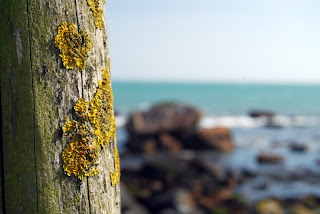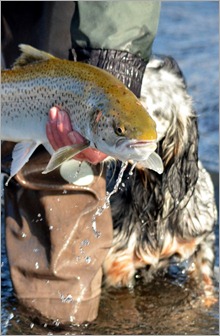
I started my saltwater guiding business during 2003. Along the wild and beautiful southern coasts of Wexford I spent time seeking Bass and Seatrout. I realised there was great potential for sportfishing and adventure with Saltwater Fly and light Lure
I have carefully developed and continued to build a customer base consisting of progressive European and Irish saltwater sportfishers.
My saltwater guiding services have continued to grow and develop and I constantly attempt to improve and add value to your angling experiences.
I believe that fishing is about the experiences, the things you see and hear on the way, there and back, the moments you have that fishing has given you, the places the adventure has brought you to, after all you have found yourself here!
The Service Overview
All travel is arranged both to and from your airport - Dublin, Cork or Waterford in our comfortable SUV.On your arrival you can relax in our quality accommodations based in a quiet mature suburban setting, a short walk from our town centre.
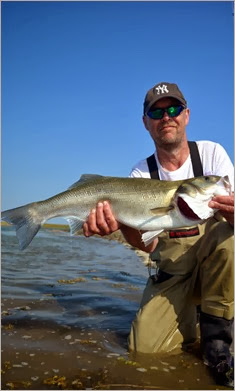
Information is provided in our SEAi info pack on your arrival and you can sample some of Wexford’s local breads, cheeses and Jams from our welcome basket.
Of course your fishing is matched to the optimum weekly tides and a printed plan of our daily activity and fishing requirements including regulations is provided and discussed in detail both on your arrival and reviewed on a daily basis.
Wexford town and all of its amenities is easily accessible, you are less than three minutes walk from all local restaurants, shops, pubs and many places of historic interest.
I recognise that todays visiting anglers are not only interested in but expect the following from their guiding services
- A modern approach to guiding coupled to a high degree of success whilst providing competent safe and insured angling solutions
- An in depth knowledge of saltwater lure fishing, all its technologies, target species and maximum potential realised
- An in depth knowledge of saltwater fly fishing, casting, target species and maximum potential realised
- Educational facilities and opportunities incorporating leading edge methods and techniques with a view to improving angling skills
- Availability of balanced quality tackle and equipment ensuring maximum fishing pleasure
- Quality accommodation and hands on service and support facilities

The Guiding Service offers the absolute highest level of professionalism and customer service. When you book a trip with SEAi for Saltwater guided fishing, you can expect an experience punctuated by, and emphasised around you, your safety and enjoyment.
I am a fully insured professional guide with ten years of genuine angling and guiding experience along the coastline of South Eastern Ireland. Coupled to that I am qualified to train and I have just recently completed a Leave No Trace trainers course which I have incorporated into the guiding services.
Whether you are a seasoned angler or someone who is interested in either learning the craft of saltwater fly or lure fishing, or simply improving your angling skills, I hope your visit to Wexford and the SEAi centre can exceed your expectations.
My service offers a variety of bespoke guiding solutions catering to your needs, for example
- One night stay and one day workshop - two four hour sessions with lunch €210.00
- One night stay and one days workshop - one six hour session with light refreshments €195.00
- Two nights stay with two days guiding - bespoke to your requirement €400.00
- One week stay five days guiding - bespoke to your requirements - p.o.a with booking deposit
- Also please visit www.jimhendrick.com for a new angling service for 2014
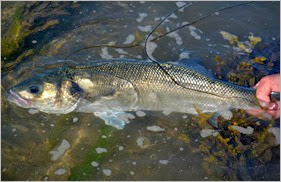 Trips include provision of top of the range lines rods and reels, flies, lures and terminal tackle.
Trips include provision of top of the range lines rods and reels, flies, lures and terminal tackle.I genuinely take your safety, enjoyment and relaxation very seriously, and I will go that extra mile to ensure your stay is a memorable one - regardless of whether you catch one fish or fifty.
Regarding Cancellations
In the event of your unfortunate cancellation either in whole or part after your booking has been confirmed, you must inform us in writing or confirmed verbal agreement as soon as possible. If you do cancel I reserve the right to charge a cancellation fee on the following scale.
Amount of notice you give to us before your confirmed fishing date:
More than 60 days - loss of booking deposit only (€100.00)
29 – 42 days 30% or deposit if greater
15 – 28 days 50%
1 – 14 days 75%
The above terms relate to reserved daily guided fishing with light lunch and/or self-catering accommodation at No 7 St Johns Road. No refund will be given for cancellation on or after the confirmed arrival date. Cancellation charges are expressed as % of the total holiday price excluding insurance charges. Insurance premiums are not refundable or transferable. Any external arrangements regarding accomodation individual terms will apply.
The Fishing Requirements
Salt-water lure and fly-fishing along the south east coast of Ireland offers some of the most productive and unspoilt fisheries in Europe. There are many opportunities for not only catching some quality fish but also for catching some different sporting species like sea trout and mullet on the fly or indeed lure. Your hunting grounds are very special places and have proven over time to hold some excellent fish.
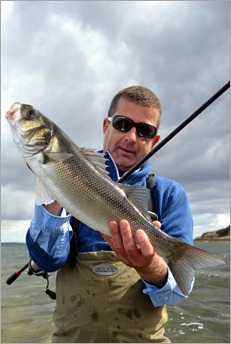
By putting into practice various saltwater fly-fishing and lure fishing techniques and methods South East Angling Ireland will ensure that you can benefit from this extensive knowledge. A committed customer service enhances not only your stay but my own experiences also.
Our principal target species is bass; sea trout, mullet and pollack are also available to the interested angler. Along the way we may also encounter garfish, mackerel, mullet and wrasse. Should you require any equipment such as rods reels or lines SEAi can provide them all. Simply inform us of your tackle needs and we will supply them for you.
Saltwater lure fishing tackle considerationsThe equipment required for saltwater lure fishing should consist of a lure or spinning rod, length of between 8'6" to 10'-0" capable of casting lures in the range of 10-30 grammes. A good quality fixed spool reel in the 3000 to the 3500 range or size loaded with 8 or 9 kgs braid is perfect. A range of diving and surface lures is also required and lure decisions can be influenced by the time of year and weather - for more details please call or mail me for best advice.
If you require a boat fishing session then a slightly different outfit can be used as we often need to cast larger lures in the 35-75 grammes range so a suitable rod is recommended.Braid strength needs to be increased too - about 15kgs is sufficient. Again advice on lures and lure choice and tackle can be had by mail or phone.
Saltwater fly fishing tackle considerations
Generally required is a #8 - 9’0” saltwater rod, a saltwater large arbor reel with 75 to 100 yards of 10kgs backing. Lines need to be of two types floating and intermediate and they need to posses the profiles necessary to cast large bulky flies at times! If we need to go deep a fast sinking line can be provided. The intermediate lines should have a sink rate of between 1 and 2 ips. Leader material needs to be a combin
 ation of tough hard mono and a fluorocarbon or mono tippet. If you require any of these items for your holiday we will be happy to provide them for you at the agreed tariffs. A line tray is essential. Flies can be provided as a complimentary addition to you holiday. All lines and tippets can be IGFA approved if required.
ation of tough hard mono and a fluorocarbon or mono tippet. If you require any of these items for your holiday we will be happy to provide them for you at the agreed tariffs. A line tray is essential. Flies can be provided as a complimentary addition to you holiday. All lines and tippets can be IGFA approved if required.The gear and accessories
The outdoor clothing you will need should consist of breathable wind resistant rain jacket and a pair of breathable or very light neoprene waders. Felt soled or a combination of studded and felt wading boots, a pair of Polaroid glasses, a cap and if you are travelling in autumn some thermal underwear. We recommend a layering system. If these items are not available to you then any suitable waterproof system can suffice shorterm. Sunfactor, a hat or cap and a digital camera are also recommended. Lots of locations require long walks to and from the fishing across rocky slippy ground - it is essential that you have the right footwear and clothing.



























